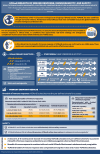4CMenB Breadth of Immune Response, Immunogenicity, and Safety: Results From a Phase 3 Randomized, Controlled, Observer Blind Study in Adolescents and Young Adults
- PMID: 39582508
- PMCID: PMC11584413
- DOI: 10.1093/ofid/ofae638
4CMenB Breadth of Immune Response, Immunogenicity, and Safety: Results From a Phase 3 Randomized, Controlled, Observer Blind Study in Adolescents and Young Adults
Abstract
Background: Meningococcal serogroup B (MenB) strains are highly diverse. Breadth of immune response for the MenB vaccine, 4CMenB, administered at 0-2, 0-6, or 0-2-6 months, was demonstrated by endogenous complement-human serum bactericidal antibody (enc-hSBA) assay against an epidemiologically relevant panel of 110 MenB strains.
Methods: In a phase 3 trial, 3651 healthy 10- to 25-year-old participants were randomized 5:5:9:1 to receive 4CMenB (0-6 schedule), 4CMenB (0-2-6 schedule), investigational MenABCWY vaccine, or control MenACWY-CRM vaccine. The primary objectives were to evaluate safety and demonstrate breadth of immune response by enc-hSBA assay against the MenB strain panel using test-based (percentage of samples without bactericidal activity against strains after 4CMenB vs control vaccination) and responder-based (percentage of participants whose postvaccination sera kill ≥70% strains) approaches. Success was demonstrated with 2-sided 97.5% confidence interval (CI) lower limit >65%. Immunogenicity was assessed by traditional hSBA assay against four indicator strains.
Results: Breadth of immune response (test-based) was 78.7% (97.5% CI, 77.2-80.1), 81.8% (80.4-83.1), 83.2% (81.9-84.4) for the 0-2, 0-6, and 0-2-6 schedules, respectively, and (responder-based) 84.8% (81.8-87.5), 89.8% (87.2-92.0), and 93.4% (91.2-95.2), respectively. No clinically relevant differences in immunogenicity were observed across schedules. 4CMenB was well tolerated.
Conclusions: The 2-dose (0-2, 0-6) 4CMenB schedules met predefined criteria for success for both breadth of immune response endpoints against a diverse MenB strain panel, had comparable immunogenicity, and safety in line with the established 4CMenB safety profile. The 3-dose schedule provided no additional immunological benefit, supporting use of the 4CMenB 0-2 schedule.
Keywords: 4CMenB; Neisseria meningitidis; bactericidal assay; breadth of immune response; meningococcal vaccine.
© GSK Plc 2024. Published by Oxford University Press on behalf of Infectious Diseases Society of America.
Conflict of interest statement
Potential conflicts of interest. Terry Nolan reports payments to his institution from GSK for the conduct of this study. Terry Nolan also reports payments and/or memberships from GSK, Pfizer, Seqirus, Moderna, MSD, Iliad, Dynavax, SII, AstraZeneca, Clover, Novavax, and IVI/SK Bio. Chiranjiwi Bhusal is employed by GSK and holds financial equities in GSK. Jiří Beran has nothing to disclose. Mark Bloch reports payments to his institution from GSK, MSD, ViiV Healthcare, Gilead Sciences, Sanofi, Novo-Nordisk, Pfizer, Novavax. Mark Bloch also reports payments and/or memberships from ViiV Healthcare, Gilead Sciences, EyeGene, Cymra DSMB, and holds shares in CSL. Benhur Sirvan Cetin reports payments from GSK and MSD. Ener Cagri Dinleyici performs contract work for Eskisehir Osmangazi University that is funded by GSK, Sanofi Pasteur, and Pfizer. Daniel Dražan reports payments from GSK, Pfizer, and Sanofi. Daniel Dražan also reports he is a member of the Committee of the Czech Vaccine Society. Satu Kokko has nothing to disclose. Susanna Koski reports payments from Moderna and Pfizer. Outi Laajalahti has nothing to disclose. Joanne M. Langley reports payments to her institution from GSK for the conduct of this study. Joanne M. Langley also reports volunteer service for the Meningitis Foundation of Canada as a Senior Medical Advisor. Mika Rämet reports payments to his institution from GSK for the conduct of this study. Mika Rämet also reports his institution carries out clinical vaccine studies for all major vaccine manufacturers. Peter C. Richmond reports payments to his institution from GSK for the conduct of this study. Peter C. Richmond also reports payments to his institution and/or advisory board memberships from GSK, Merck, Sanofi, and Pfizer. Peter Silas reports payments from GSK, Seqirus, Merck, Sanofi, Vir, Moderna, Novavax, Hillevax, Affinivax, Astra Zeneca, and Novo Nordisk. Bruce Tapiero reports payments to his institution from GSK for the conduct of this study. Bruce Tapiero also reports payments to his institution from Merck, Pfizer, and Moderna. Florence Tiong has nothing to disclose. Mary Tipton has nothing to disclose. Benita Ukkonen reports payments from Moderna. Betul Ulukol reports payments from GSK, MSD, and Pfizer. Maria Lattanzi is employed by GSK and holds financial equities in GSK. Mauro Trapani is employed by GSK. Arnold Willemsen is employed by GSK. Daniela Toneatto is employed by GSK and holds financial equities in GSK. All authors declare no other financial and nonfinancial relationships and activities.
Figures




References
-
- Stephens DS, Greenwood B, Brandtzaeg P. Epidemic meningitis, meningococcaemia, and Neisseria meningitidis. Lancet 2007; 369:2196–210. - PubMed
-
- Parikh S, Campbell H, Bettinger JA, et al. The everchanging epidemiology of meningococcal disease worldwide and the potential for prevention through vaccination. J Infect 2020; 81:483–98. - PubMed
Publication types
LinkOut - more resources
Full Text Sources
Miscellaneous

